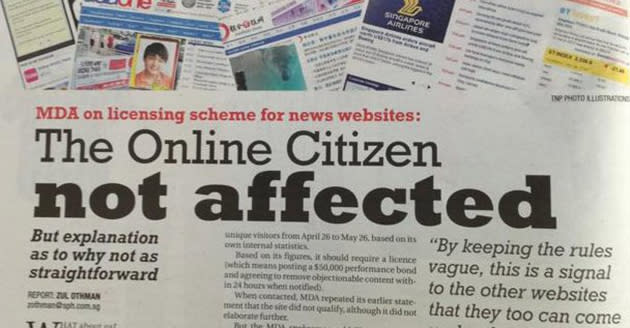COMMENT: CPE should accede to blogger’s request
Andrew helms publichouse.sg as Editor-in-Chief. His writings have been reproduced in other publications, including the Australian Housing Journal in 2010. He was nominated by Yahoo! Singapore as one of Singapore's most influential media persons in 2011. The views expressed here are his own.
On 28 October, 21-year old blogger, Han Hui Hui, issued a challenge to the Council of Private Education (CPE) “to proceed with the hearing of her application for a determination of the issue as to whether a public body can sue for defamation”.
The CPE had threatened to sue Han over certain emails she had sent out to various parties, including members of the media. The CPE, a statutory board, alleged that it had been defamed by her comments in the emails.
Han, however, lodged an application with the court in April for it to declare that a statutory board cannot sue for defamation. Her argument was that the CPE “being a government body with corporate status does not have a right to sue for defamation or threaten to sue for defamation under common law”.
Both sides later came to a settlement in October – with the CPE offering not to sue Han if she withdrew her court application, which Han agreed to.
However, in comments to news reports about the settlement, the CPE claimed that it was Han who had first approached it to discuss a settlement of the matter. It is a claim which Han rejected, saying that in fact the offer to settle was from the CPE.
Now, Han is – in effect – calling the CPE’s bluff and is asking it to agree to set aside the settlement, as required by law, so that her application can be resumed before the court.
It has been three days since her lawyer, M Ravi, sent the letter to the CPE with the request.
The CPE has not responded.
The case, in fact, is an important one for Singapore, considering that such a matter has never been raised in the courts before. Also, it is pertinent that the public be certain of whether they can be sued by government bodies, including statutory boards. (Incidentally, there are more than 60 such boards in Singapore. See here.)
At the heart of the case is the question of “whether the prospect of defamation proceedings constitutes a limitation on free and open scrutiny and criticism of a governmental body, such as the CPE.”
With the Singapore government tightening the rules on speech and expression on the Internet, most recently with the new MDA rules and the expected changes to the Broadcasting Act next year, open scrutiny and criticism of the government and its organisations are pertinent issues.
This is even more so given how the new MDA rules, for examples, are murky and questionable. They give the minister almost unfettered power to make arbitrary decisions which he does not have to explain to the public.
For example, one of the new rules is that websites which report or publish more than one “news” article per week about Singapore over a period of two months, qualify to be regulated. However, questions about what constitutes “news”, and the seemingly arbitrary period of two months, have been raised without satisfactory or clear explanations from the authorities.
The Online Citizen, as another example, clearly meets the thresholds for regulation or registration. But when asked, the government keeps insisting that TOC does not fall under the requirements – without explaining why.
There are many other such questions when it comes to the government’s regulations on speech and expression in Singapore.
Ambiguity and opacity are inherent in our laws on such things.
Coupled with Singapore’s rather wide definition of what constitutes defamation in our law books, the threat by government bodies such as the CPE – which have resources enough to engage top law firms and be joined by the Attorney General’s Chambers in their case against Han – makes it a daunting task for the average citizen to assert their rights under the Constitution. This is especially so for someone as young as Han who has very limited financial resources to fight any defamation case.
It would indeed be a sad day if members of the public have to constantly tread on eggshells, while navigating invisible out-of-bound markers, all the time wondering and being intimidated by the possibility of being threatened or sued by well-resourced government bodies.
It is to Han’s credit that she is not shying away from the challenge, and to have this matter clarified by the courts. Indeed, this is how it should be.
It is now up to the CPE to agree to allow the court to decide on the matter.
There really is no reason why the CPE should not agree to setting aside the settlement for the greater good of society and for clarity.
A court hearing will benefit everyone.



